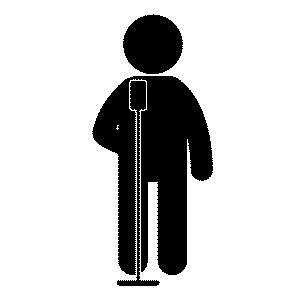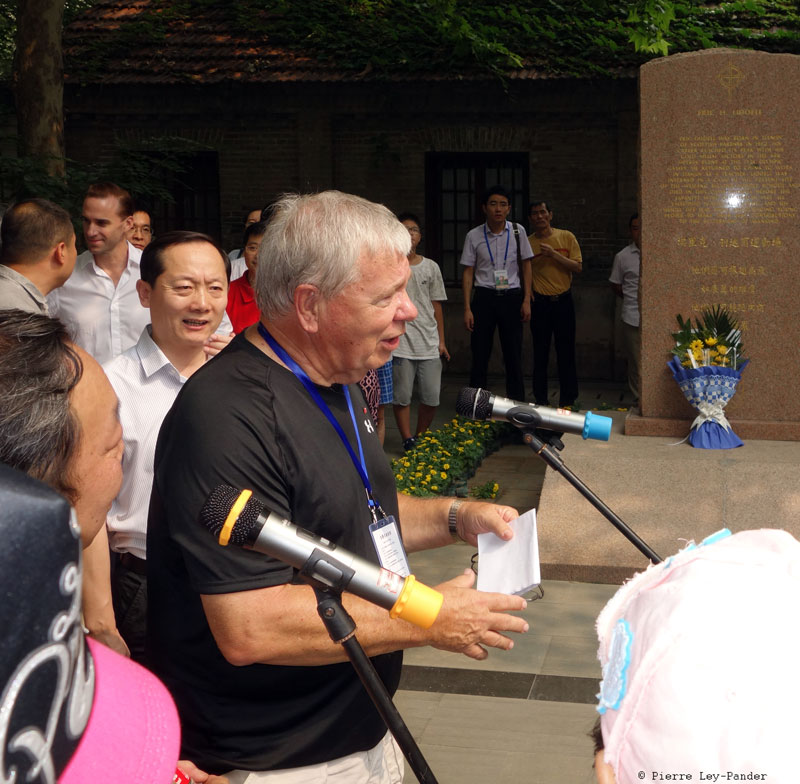
- Liberation Day: August 17, 2015 ... 70 years later ...
- Speech by Brian Butcher:
WEIHSIEN CELEBRATION OF 70 YEARS SINCE LIBERATION
August 17, 2015
Eight years ago my wife, my brother and I visited the Camp in Weifang. We were stunned at what had been created and at the work that had been done to preserve the site. I stood at the Wall and traced my name on the marble and it was impossible to describe my emotion in seeing my name and the names of my parents cut into the marble.
The whole Wall itself with the hundreds of names and the monument with the names of the internees in Chinese were amazing and we were moved at the care taken by the Shangdong Government and the Peoples’ Republic of China in creating this Memorial.
We looked down the two rows of preserved buildings behind the moon gate and memories came flooding back of cold winters, hot summers and cramped quarters.
Shadyside Hospital stood there as I remembered it and deep in the basement we came across men who lived there who greeted us with smiles and laughter.
I extend my congratulations to the Shangdong Government in preserving this site and in welcoming all of us back for the 70th anniversary of the Liberation of the Camp from the Japanese.
This event celebrates also the important link between the internees and the Chinese who risked their lives in bringing information about the events in the outside world, in providing food through the black market and though in poverty themselves, raising money to provide medicine for the internees. As a child I never appreciated their efforts on behalf of all of us in the Camp.
I remember the day my mother cried as she bartered her wedding and engagement rings to purchase black market food that was smuggled into the Camp. It wasn’t until much later as an adult as she reminisced about that day, that I realized what that cost her to provide a little extra food for her family.
There were the rare Red Cross letters from home and the occasional parcel with my favourite treat – Marmite. I loved that stuff and still have a jar in the cupboard.
Small children are resilient and what might be times of hardship and pain for adults was a very different experience for me. I played with other boys, attended kindergarten and in my own way enjoyed the three years of internment. Although our room was tiny in comparison to our home now, my memories are not painful. In the cold of winter there were coal balls for the fire: tin cans for a chimney; huddled in bed for warmth; clothing hanging on the walls, frozen trips outside to the kitchen for food; and of course, short pants and cold knees.
In the summer it was play outside; sorting through my collections of razor blade packets given to me by the single men in the dormitory, Gillette and Pal; collections of labels from tin cans that became my prized possessions; comparing my collections with those from other boys. I don’t remember where the labels came from: they were simply there.
Liberation for me is as vivid a memory as anything since. I still see the first huge plane coming low over the camp, the frenzied excitement of the adults and older children: the parachutes spilling into the sky, the bright coloured chutes as they came down and the tumultuous welcome as the internees rushed to greet them; the awe of seeing heavily armed American soldiers for the first time. Then shortly thereafter the flood of colour as barrels of food came down from the planes. One unopened barrel came crashing down and few meters from me.
There was a flood of chocolate, jam, biscuits and foodstuffs that I had never seen. That was my first taste of peanut butter and to this day, all peanut butter is compared with that first taste. The parachutes became treasures themselves as my mother collected some of the nylon and even years later used that nylon to make cushion covers.
I remember the armed soldiers coming and my first glimpse of British sailors marching into the camp and the swell of pride as a little five year old English boy at seeing British armed men.
The pictures of my parents from that time showed an emaciated couple like all the other internees. I am sure that the food in the barrels was welcome but it must have been a strain on their digestive systems.
We left the Camp finally and went by train to Tsingtao, as it was spelled at that time. After we left the train and were taken to the hotel where we stayed for a short time, I saw Japanese soldiers, still in their khaki uniforms, humiliated and clearing rubble under the watch of British soldiers and sailors.
It was there that I had my first taste that I can remember of banana and I gorged on them until I could stand them no more. I have memories of white tablecloths, ranks of glittering silverware on both sides of my plate and most curious of all, a fish knife with the little hook on the tip. The contrast with Weihsien and meals in the hotel was like visiting another planet.
We left Tsingtao for Hong Kong on an American troopship encountering a huge typhoon that closed off the outside decks so we were stuck below while the ship corkscrewed through the waves. That was my first encounter with hammocks and ten hole-in-a-row toilets.
As vivid as the memories of being liberated are the memories of the Spitfires screaming low over the troopship as we entered Hong Kong Harbour. I watched those beautiful planes and the red white and blue roundels as the three Spits welcomed the troopship filled with cheering internees to Hong Kong.
From Hong Kong we went back to England in the Empress of Scotland, a former liner, around Malaysia, through the Suez Canal, the Mediterranean and home to Southampton and a whole new existence so different than the one in Weihsien. In England I also welcomed my brother into the world, a brother conceived in the Camp and delivered in England.
We are so grateful for this Celebration and for the people who organized this for us all and to the Peoples Republic of China and the Shangdong Government.
To Mr. Sui Shude in particular, many heartfelt thanks from my family for all you have done.
Thank you.
#

